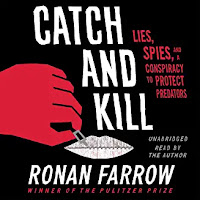I have a confession to make: I am finding it difficult to read children's books. this is hard for me to admit, being a children's librarian; it's my job. If you look closely at my signature in Gmail, you will see I only have children's books listed as things I am reading and listening to. While that is not entirely untrue, it's not entirely true either. I started those books weeks ago, but I haven't made it much past the first few chapters. Realistic and historical fiction just doesn't hold the draw it typically has for me. I'm not interested in the struggles of made up characters in the present or past. Instead, I find myself picking up narrative non-fiction.
The other thing I find disheartening is my inability to actually focus on and read a print book. I find myself reaching for my computer every couple of minutes to look something up or to add one more thing to a class I am working on. I have even resorted to stashing all of my devices away and setting a timer to force myself to concentrate and read, but it hasn't really worked.
It began over spring break, while listening to the book Rising: Dispatches from the New American Shore, this year's Read Across Rhode Island pick. It came as a welcome respite from the world's current state of affairs to dip into the rich, evocative language of Elizabeth Rush. The idea for this book came as a response to a story she covered at the border between India and Bangladesh. She realized that many of the conflicts between the two countries actually arose from issues related to sea-level rise in the area. This brought her to the question of whether she could discover places in our country where rising seas directly affect the people who live there.
I couldn't put my finger on why I could easily get lost in a book about the dire effects of climate change while I couldn't read or listen to much about the spread of Covid-19. However, as I read, I drew parallels between our lack of preparedness for climate change and the onset of the coronavirus. What drew me most to the narrative, besides the beautiful language, were the stories of communities that came together to respond to the flooding of their homes in ways that preserved their tight social communities and allowed the land to return to its natural role of protecting our coast.
Over break, I also binged on podcast after podcast. One of the most compelling was To Catch and Kill, Ronan Farrow's recounting of his undercover story on Harvey Weinstein for NBC and The New Yorker. This podcast led me to the audio book of the same name. In it, Farrow delves into the stories of the women who came forward after years of fear to publicly expose the traumas they faced at the hands of the movie executive. Farrow also describes the fallout after the story went public and the tactics Weinstein used to dig up dirt on the survivors and journalists who covered the story. Again, I wondered why I could get lost in this book but I had trouble reading people's personal accounts of loss, during the coronavirus outbreak, with out falling apart.

More recently, I watched the Netflix series, Unorthodox and that led me to download the audio
book of the memoir by Deborah Feldman that is the basis for the series. I found the narrative transfixing as she described her early experiences in her Hasidic Jewish community and then her disillusionment with it once she got married. She discovered that married life did not provide the opportunities for freedom that she once imagined. She secretly signed up for writing classes at Sarah Lawrence where she began to see herself as a writer and young woman with aspirations of her own. This led her to carefully extricate herself and her young son from the community.
You may wonder, as I did, why I have been drawn to such tragedies. In writing and thinking about this post, I discovered the thread that ties these books together. It is this: they are all stories of real people overcoming devastating traumas in realistic, ugly and sometimes magnificent ways. Perhaps these books, for me, have provided a personal bibliotherapy. In each book, I see regular people who lived through extraordinary circumstances and came out the other side stronger and more connected to the communities around them. These stories provide the hope I crave in these scary and uncertain times.

